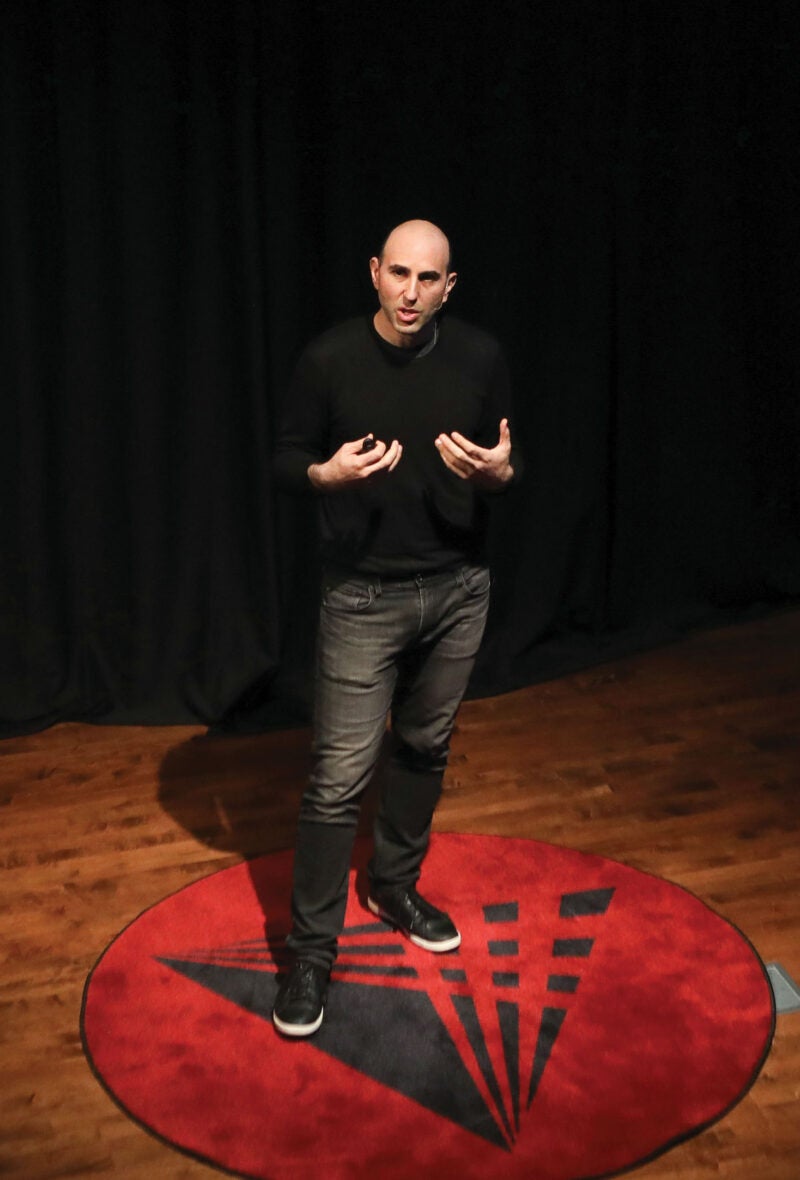When Marvin Ammori ’03 was a child, he asked his uncle whether there was MTV in Iraq. His uncle, who stayed in the country for a while after his parents had left, said no: Iraq had only two channels, and both showcased President Saddam Hussein. The lack of options left an impression. “That seemed like an injustice,” Ammori says with a laugh.
As an adult, Ammori has spent his entire career advocating for an abundance of choice. A lawyer, scholar, and activist who focuses on the intersection of the First Amendment and technology, he is best known for his role in the battle for net neutrality. At stake is the principle that internet service providers, or ISPs, should treat all internet traffic neutrally, meaning they ought not block or promote specific websites, favor certain users over others, or pick which services to speed up and which to slow down.
Ammori is a leader among net neutrality proponents, who argue that allowing ISPs to control internet traffic would threaten both economic growth and a free democracy. Its opponents argue that government regulation of the internet, by contrast, stifles creativity and growth.
For a few years, regulation won out, thanks in large part to Ammori’s efforts. In 2007, when he was general counsel at media nonprofit Free Press, he sued Comcast in the first network neutrality enforcement action. Comcast, a major ISP, was accused of blocking traffic between users of BitTorrent, a peer-to-peer network that allows individuals to upload and download content directly to and from each other. Ammori wrote the complaint challenging Comcast’s actions and convinced the Federal Communications Commission that Comcast had overstepped.
The war appeared to be won in 2015, when Ammori and others persuaded the FCC that the internet should be declared a “telecommunications service” under Title II of the Communications Act. Doing so cemented the FCC’s authority to impose net neutrality, which had otherwise been challenged in courts—including in the Comcast case. The following year, the D.C. Circuit Court upheld the FCC’s authority to regulate internet traffic, ostensibly ending the debate. But just two years later, in 2018, a new FCC chairman abruptly changed course, rolling back net neutrality rules and sparking a new round of litigation between the federal government and states that seek broader control over ISPs.
The legal and political battle for net neutrality highlights what draws Ammori to the field of law and technology: It is still unsettled. He calls the field a “war of analogies” and “platypus law,” an amalgamation of disparate legal doctrines where the challenge is to help judges understand how new technologies resemble old ones that have already been examined by courts. Is Uber more like a taxi or a limousine? Is cryptocurrency a form of software, or is it a commodity? Ammori recalls exploring these kinds of questions at HLS with his professor and adviser Yochai Benkler ’94, with whom he marveled at First Amendment textbooks’ tendency to treat modern communication methods as “exceptions” to settled law, rather than recognize them as the new normal.
Ammori is now the general counsel at blockchain research group Protocol Labs, which focuses on building network protocols to allow individual internet users to store files on one another’s computers. “The cloud,” where most people and companies increasingly store the bulk of their data, relies on servers run by just a handful of companies, centralizing control over data in the hands of a few players, such as Amazon or Google. Ammori instead promotes a “decentralized web,” where key internet services such as storage can be provided by the collective power of millions of individual computing devices.
Whether or not Ammori and Protocol Labs succeed in decentralizing the web, technology will continue to provide new legal frontiers for him to explore. He anticipates new wars of analogies emerging as artificial intelligence, bioengineering, and drone technology all evolve and play increasing roles in our lives.
All will require regulation and creative legal reasoning based on outdated technology. “There was a view early on that the internet was beyond law,” Ammori says. That view was wrong, he says, citing both regimes that limit internet access and countries with sophisticated regulatory systems. “The same way the pen is mightier than the sword, for a lot of these questions, the law is often even mightier than the technology, and is essential.”
